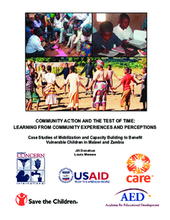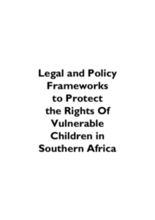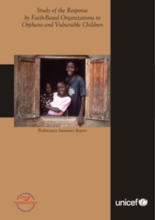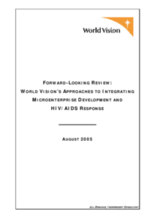childrens_living_arrangement
children_living_without_bio
Displaying 91 - 100 of 102
Brief overview of a project designed to give monetary aid to poor families. Program seeks to reduce poverty while promoting health and education.
Through an examination of over 800 thematic drawings and stories, regarding ‘moving house’, produced by children aged 10–17 years in urban and rural communities of Lesotho and Malawi, this paper explores southern African children’s representations of migration.
This briefing paper emerges from a review of 14 national plans of action (NPA), or in the absence of a NPA, outputs from the rapid assessment analysis and action planning (RAAAP) work for orphans and children made vulnerable by HIV/AIDS. The purpose is to analyse the way that issues of social protection are incorporated into these plans and to highlight areas within the plans where social protection activity may be needed to achieve stated outcomes. Annex 3 summarises, country by country, the social protection content of each NPA.
Research on the effectiveness and sustainability of established initiatives for vulnerable children in Zambia and Malawi. Outlines implications for approaches to community mobilization in current programming efforts.
Reviews legal and policy frameworks for the protection of OVC rights in 10 Southern African countries. Includes key concerns and recommendations. Appendix includes country-specific details of National Policies on Orphans and Vulnerable Children and National Plans of Action.
A study that looks at the response of faith-based organizations in Kenya, Malawi, Mozambique, Namibia, Swaziland, and Uganda. The report contains statistical information, and details positive care practices to build on, and negative examples to avoid.
A report on several pilot projects launched by the World Vision and affiliated microfinance institutions to address the association between poverty and HIV. A description of pilot projects in Zimbabwe, Uganda, South Africa and Malawi are discussed.
Discusses the interplay between informal and formal safety net mechanisms in supporting orphans and children made vulnerable by HIV/AIDS. Includes recommendations for strengthening traditional family and community safety nets weakened by the epidemic.
A report on orphans and vulnerable children in Malawi. It examines how orphanhood increases vulnerability though decreased access to formal schooling and increased exposure to child labor. Includes detailed statistical tables.
Research on the incidence, living arrangements, and causes of lower school enrollment of orphans in Sub-Saharan Africa.








